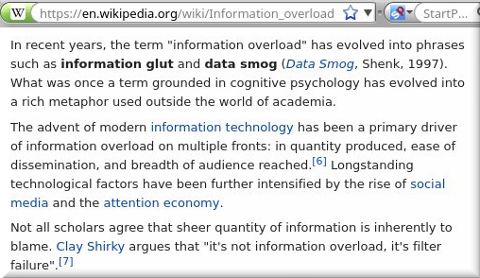
 Reference: Information overload
Reference: Information overload
THIS WEEK has been historic at the EPO not because of scandals or conflicts but because of a decision we covered here several times*. It was a major blow to patent maximalists.
"Even EPO staff is being crushed nowadays. Nobody is being served but billionaires.""Are you a #patent professional? Here's an interesting opportunity," the EPO wrote yesterday, linking to this promotion of internships (warning: epo.org link). The EPO "races to the bottom of salaries and assurance to staff," I told them, "thus ensuring longterm brain drain. Interns are low-paid staff with no assurance of work. Is this the future of the EPO under Battistelli 'reforms'? Remember that starting January 1st (2018) all EPO examiners lost their permanent contracts, reducing work security for docility. Terrible."
The EPO's official account "follows" me in Twitter. Sometimes I think some good people are behind it, but in order to pay the mortgage they need to obey the high-level management, knowing that they too can suffer (along with their families) if they don't play along.
Watch what they posted yesterday: Distraction from real EPO news (about CRISPR). Instead they share Battistelli's photo op in which there's promotion of software patents in Europe. The EPO basically republished its 'news' about "computer implemented inventions"; pushing the unthinkable again? To quote the original (warning: epo.org link): "Other topics discussed during the meeting included procedural changes at the EPO and recent case law, standard essential patents, the EPO's approach to computer implemented inventions, and IP activities in the Internet of Things era."
The "CII" dodge aside (that's what they call software patents in Europe), there's also that buzzword, "Internet of Things", once again; that too is a modern trick for sneaking software patents past examiners.
Battistelli's EPO is stretching patent scope further and further, but the opposition to a CRISPR patent showed that some staff is managing to do the right thing and end this injustice. This is still circulating in technical media and European media. "The vast majority of the Broad Institute's CRISPR patents in Europe are also affected by this same deficiency and we expect them to meet a similar fate," ERS CEO Eric Rhodes said. It's the likely end of CRISPR patents in Europe though the matter is likely to reach the Enlarged Board of Appeals. To quote:
CRISPR/Cas9 has been hailed as the ‘scientific discovery of the century’ due to its capacity to modify the genome for the treatment of genetic diseases. The Broad Institute, set up by MIT and Harvard in 2004 to use genomics to improve human health, successfully obtained a patent from the US Patent Office for its use in eukaryotes. However, the European Patent Office (EPO) has revoked the first of several patents obtained by the Broad Institute, citing a clear lack of novelty.
Outgoing European Patent Office (EPO) President Benoît Battistelli was elected Chairman of the University of Strasbourg Center for International Intellectual Property Studies Administrative Board in November for a three-year term. He succeeds António Campinos, Executive Director of the European Union Intellectual Property Office.
Campinos, a Portuguese national, was elected in October as the new EPO president for a five-year term starting on 1 July 2018.